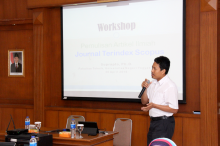You are here
Abstract is Advertisement from Scientific Articles
Primary tabs

"Abstract is an advertisement for a scientific article that you make, so make sure that it is interesting in telling potential readers what you have done and what important findings are in your research," said Suprapto, Ph.D., Lecturer in Electronics Engineering Education and Informatics, Faculty of Engineering, Yogyakarta State University in a Scientific Article Writing Workshop held in the FT UNY KPLT Meeting Room (30/04/2018). This activity was attended by lecturers from the Faculty of Engineering, Yogyakarta State University, Faculty of Industrial Engineering UPN “Veteran” Yogyakarta and Sarjanawiyata Tamansiswa University who were presenter candidates in the 2018 International Conference on Technology and Vocational Teachers (ICTVT).
ICTVT 2018 itself will be held at the UNY Digital Library on November 15 2018, where the Faculty of Engineering, Yogyakarta State University as the Host, collaborates with the Faculty of Industrial Engineering UPN “Veteran” Yogyakarta and Sarjanawiyata Tamansiswa University Co-Host.
In addition, Suprato explained that an abstract is a short description of the perspective and purpose of the paper. "So, take the time to make sure your abstract is really easy to read and understand and contains a complete and accurate description that reflects your article," said the man who recently earned a doctorate from Electrical Engineering, National Yunlin University of Science and Technology, Taiwan.
Furthermore, Suprapto suggested emphasizing research in order to get good quality paper. Apart from that, according to him, an introduction or introduction is also very crucial so that the writer should spend half the time writing the introduction and conclusion and the other half of the time for the main body of the paper. "It is necessary to remember that the introduction should not be more than two pages, because if it is more, it is considered as lecturing and its contribution can be considered minor because there are too many technical discussions which may not be appropriate in detail," he explained.
Then, Suprapto mentioned the mistakes that often occur when making a conclusion or a conclusion where a common mistake in this section is repeating the abstract, or simply listing the results of the research.
"The conclusion must be a scientific justification of what has been done and recommendations for further research, if your findings are still preliminary, suggest future studies that are needed next," explained Suprapto.
In the reference section, Suprapto suggests avoiding too many references. "And avoid excessive self-citations and excessive citation of publications from the same location," he added.
This workshop was then followed by a peer-discussion to gather input from peers on the papers of each participant. (Source: ft.uny.ac.id) MUS
Contact Us
Address : Kompleks Fakultas Teknik Kampus Karangmalang, Yogyakarta, 55281
Telephone : +62 274554686
Email : pti_ft@uny.ac.id
Copyright © 2026,
